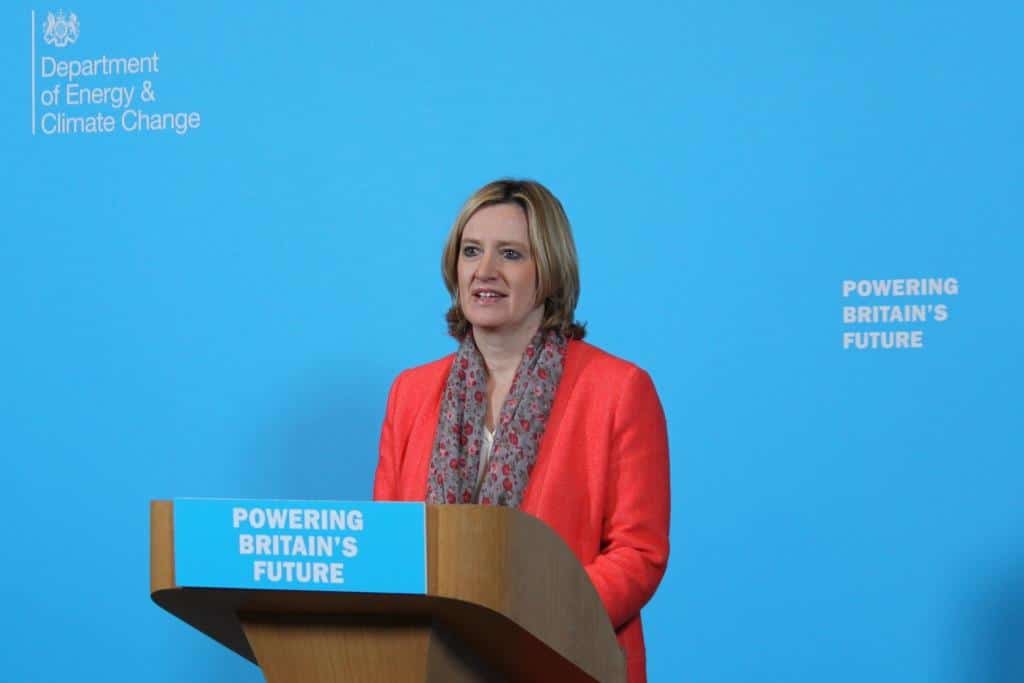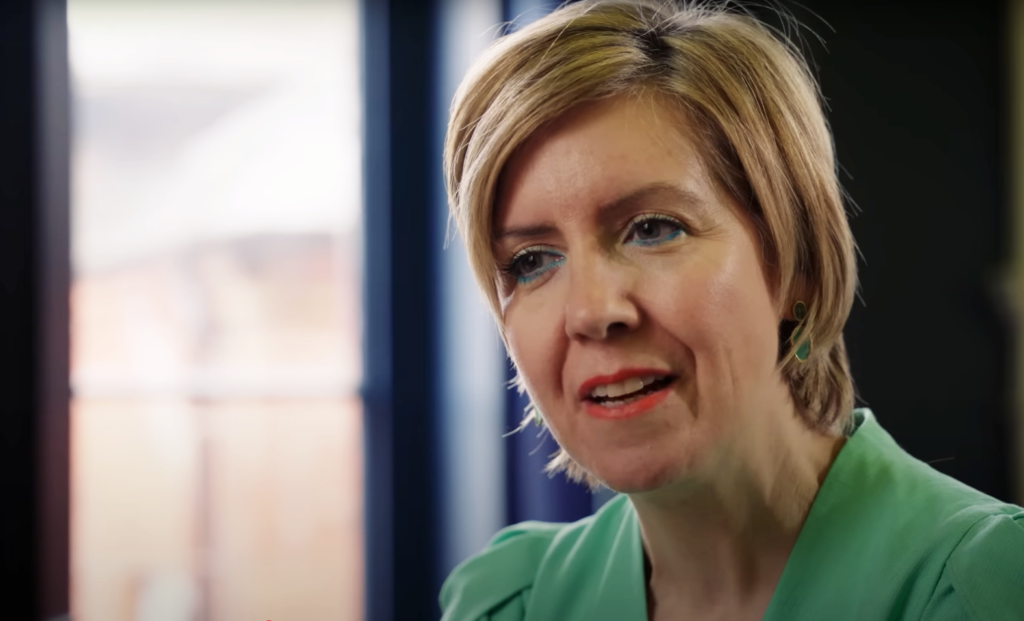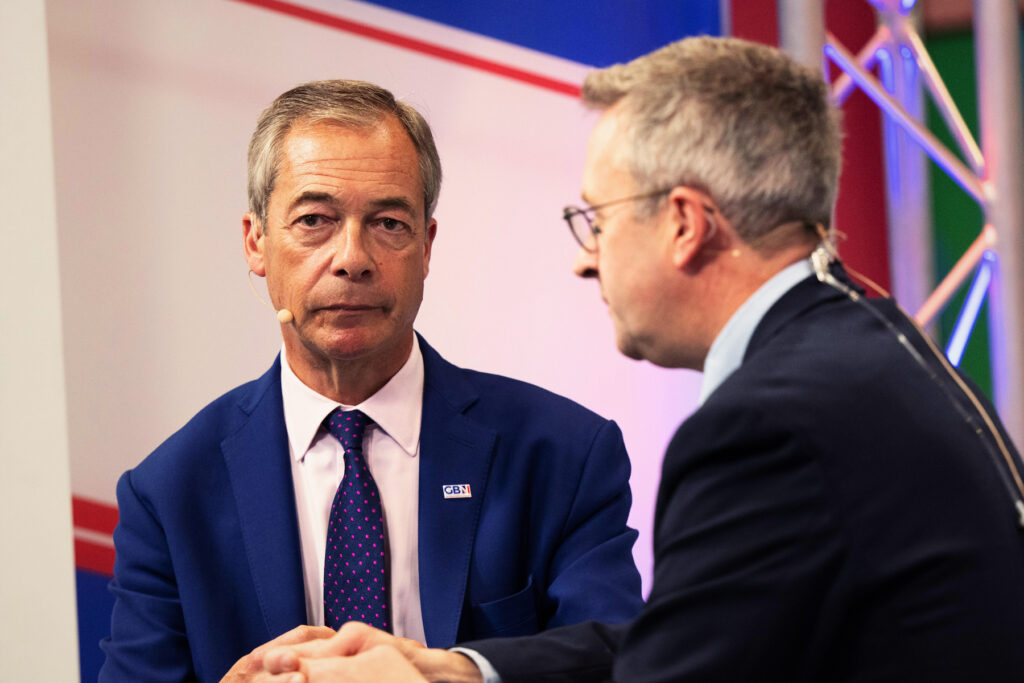All eyes are on energy and climate change secretary Amber Rudd and her team as they work to come up with a strategy to ensure the country meets its legally binding carbon targets.
The “full details” of a new emissions reduction policy will be revealed by the end of 2016, Rudd has confirmed.
Speaking at an Alderstage Group event in January she said there is the need for new policies to ensure that the UK will meet its post-2020 carbon targets. This was previously acknowledged in the new direction for UK energy policy in November 2015.
DeSmog UK reached out to DECC to find out more details on this plan. For example, which departments are they collaborating with?
But after more than a week the only answer we got from the press office was: “We are currently considering the right approach to reducing emissions in the 2020s and we will set out our proposals in full when we publish our new emissions reduction plan towards the end of 2016.”
This still leaves us with a lot of questions. Who will be involved in developing this new plan? Will solar power and onshore wind factor in it at all? What impact will the oil and gas industry have on it?
But we’re getting ahead of ourselves. Let’s start at the beginning.
Why do we need a new emissions reduction plan?
Under the 2008 Climate Change Act the UK has a legally binding goal of reducing emissions by 80 per cent by 2050. This target is based on a global goal of limiting warming to no more than 2C this century.
However, since this target was set we’ve seen world leaders negotiate the Paris climate agreement which surprised many by raising this global temperature ambition. The agreement aims to keep warming “well below 2C” and promises to “pursue efforts” to limit the increase to no more than 1.5C. It also aims to reach net zero global emissions in the second half of the century.
The UK also has a target of generating 15 per cent of all its energy from renewable sources by 2020 – an obligation which is legally binding at the EU level. This renewables target is not just for electricity but also includes energy for heat and transport.
In November, The Ecologist obtained a leaked letter in which Rudd admits that the UK is set to miss its legally binding 2020 renewables target. While Rudd has acknowledged that the UK will meet its target of 30 per cent renewable electricity by 2020, she is “concerned about the work that is being done on transport and heat”.
In the leaked letter – written to Foreign Secretary Philip Hammond, Oliver Letwin of the Cabinet Office, Greg Hands, the Chief Secretary to the Treasury, and Transport Secretary Patrick McLoughlin – Rudd revealed that the UK will only manage to get about 11.5 per cent of energy from renewables by 2020.
A government update in January 2016, further confirms that it is unknown whether the UK will meet its 2020 targets. It reads: “there are a number of uncertainties which prevent the UK from providing estimates of surplus or deficits across the three energy sectors of heat, electricity and transport, beyond 2015/16 with sufficient confidence.”
On 28 January the Committee on Climate Change (which advises government on tackling climate change) sent a letter to Rudd reviewing the UK’s targets in light of the Paris climate deal. The letter states that current efforts to cut emissions by 61 percent by 2030 are the “minimum level” required to meet the goals laid out in the Paris deal. (The government must set this fifth carbon budget target spanning 2028-32 in law before the end of June.)
However, the Committee also noted that longer-term targets to 2050 and beyond may need to be strengthened.
What do we know about the emissions reduction plan so far?
While details on this plan are vague at best, Rudd has confirmed that DECC has already started collaborating with other departments on the new strategy – although the names of these other departments haven’t actually been clarified.
A reasonable assumption however would be that this might include the Foreign Office, the Treasury, the Department for Transport, and the Cabinet Office, along with the Department for Business, Innovation and Skills. Subsidiary bodies including the Coal Authority, the Oil and Gas authority, and the Office for Nuclear Regulation are also likely to be consulted. This assumption is based on the various issues to be covered under this new plan, any ongoing consultations on these issues (as laid out below), as well as the departments which Rudd chose to include in her leaked letter.
The new emissions reduction plan is expected to build on the government’s goal of switching from coal to gas in the power sector as well as rolling out a new fleet of nuclear power stations and increased investment in renewables capacity.
Rudd also said that new thinking is required for areas such as energy efficiency, greener heat, reducing industrial emissions and transport. In these areas progress has been “slow” Rudd admitted. She also emphasised that a key focus of 2016 will be “light[ing] the fire in innovation” with regards to both technology and finance. “We must develop technologies that are both green and cheap,” she said.
How is DECC is working to address these issues?
On 26 January 2016 Rudd responded to a letter in the Times on energy policy, clarifying the department’s priorities, stating: “We are clear that a range of energy sources such as nuclear, offshore wind and shale gas all have roles to play in the low-carbon energy mix, powering our country and safeguarding our future economic security.” It is therefore very likely that these three elements will play a significant role in any future emissions reduction strategy set out by the current government.
A final decision on the Hinkley C nuclear plant however has been delayed yet again due to funding difficulties. French newspaper Les Echos said EDF was struggling to find the cash for its 66.5 per cent stake and was now “putting pressure on the [French] state, which owns 84.5 per cent of EDF, to come up with fresh funds”. The decision is now set to come on 16 February 2016.
We also know that the government is very committed to developing the UK’s shale industry with previous statements by Rudd saying that she will help to “fast track” fracking and that gas plays a vital role in decarbonisation.
On 15 December 2015, Professor John Loughhead laid out in a DECC blog that gas will also be vital is producing low-carbon heating. DECC minister Andrea Leadsom is also particularly vocal about her support for oil and gas. This month she said that “In 2030 oil and gas will still be a core part of the energy mix, providing 70 per cent of our primary energy requirements.”
Interestingly, Leadsom also shed some light on her interpretation of ‘decarbonisation’ when said the following on 18 January: “I find it extraordinary that Labour Members seem to equate the deployment of renewables with decarbonisation. That is simply not the case. They fail to recognise that fuel poverty and endless renewables subsidies go hand in hand.”
Goodbye Coal?
This brings us to coal. Last November, DECC announced that the government will be phasing out all unabated coal fired power stations by 2025, and restricting its use from 2023.
However, this comes with the caveat that the government must be “confident that the shift to new gas can be achieved within the necessary timescales.” And, according to Emily Gosden of the Telegraph, in January Rudd reassured a “worried MP that flagship plan to shut down UK coal plants by 2025 is really just a consultation.”
It’s also worth noting that this only rules out unabated coal. If any coal remains on stream, it would require carbon capture and storage (CCS) technology at scale. Yet, in November the government’s CCS scheme was scrapped.
The department has also started working to address emissions in heat and transport according to DECC’s January 2016 update.
On heat, funding will be increased from £400m in 2014/15 to £1.5bn in 2020/21. The government also intends to consult on proposed reforms to increase the cost effectiveness of the Renewable Heat Incentive scheme.
On transport, a consultation will be launched this year on increasing the amount of biofuels in transport. Any changes made on the back of this consultation however will likely not be implemented this year.
Innovation Consultation
On boosting innovation, DECC has launched a new consultation inviting the energy industry to offer its views on how best to encourage innovation across the sector. This consultation will inform DECC’s new Innovation Plan (something all departments are required to produce by spring 2016). The plan will address innovation-related activities of the Coal Authority, the Oil and Gas Authority, the Environment Agency and the Office for Nuclear Regulation.
Specific areas of energy covered in the consultation document include: North Sea oil and gas, nuclear power, shale gas, heat networks, energy efficiency, and smart energy systems. Specific questions asked in the document include: (1) How can legislation and enforcement frameworks help support new technologies and business models to encourage growth? (2) How is new technology likely to shape the energy sector? (3) How can regulators better utilise new technologies to generate efficiency savings and reduce burdens on business?
Finally, there are some things that most likely won’t be in this new plan, including an expansion of onshore wind power (covered in the Conservative Party election manifesto which pledged to “halt the spread of onshore windfarms” and “end any new public subsidy for them”) and carbon capture and storage (recall, the £1bn competition was scrapped last November). A domestic energy efficiency strategy will also likely not be included in this specific plan as energy and climate change minister Lord Bourne said in January 2016 that this would not be delivered until 2018.
What about this mysterious ‘clean growth’ committee?
At the beginning of November 2015 the Financial Times reported that Prime Minister David Cameron had set up a new ministerial committee to address public concerns about air quality following the VW emissions scandal. However, this committee will look at more than just vehicle emissions, its remit will also include climate change and green energy.
It is known as the “Clean Growth” interdepartmental committee and is chaired by Oliver Letwin, Minister for Government Policy (Cabinet Office). Others on the committee include Sajid Javid, business secretary; Liz Truss, environment secretary; Amber Rudd, energy secretary; and Transport Secretary Patrick McLoughlin.
Beyond this, no one really knows what it’s been up to.
On 19 January 2016 Labour MP Matthew Pennycook asked the committee how many meetings it has held since May 2015. Letwin responded in writing: “The Chancellor of the Duchy of Lancaster chairs an inter-ministerial group on Clean Growth, to consider issues relating to air quality and de-carbonisation where these have a cross-departmental aspect.
“The group meets as and when required, and members include ministers and officials from the relevant departments, including Defra, DECC, DfT and BIS. To protect the integrity of the policy making process, we do not comment on specific membership or the frequency and timing of meetings.”
A very similar description was given by Rudd in a January 2016 letter answering questions posed by Angus MacNeil, chair of the Energy and Climate Change Select Committee.
This letter came after Rudd was questioned by the Energy and Climate Change Committee about this new interdepartmental committee in December 2015 when giving oral evidence on the outcome of the COP21 climate conference.
Conservative MP James Heappey asked: “Finally, for our information, you mentioned earlier on a cross-departmental working group that the Secretaries of State sit on also. Could you give us a bit more information on that? Is it a working group, a Cabinet Sub-Committee, who sits on it, how often does it meet, what is its authority?”
To this, Rudd responded: “I think I will reserve my position on that. I am happy to say that this group exists and that we take the need to work across Government very seriously indeed, and will continue to do so to ensure that we work together to meet the targets that are the responsibility of the entire Government.”
Heappey pressed further: “Secretary of State, I apologise for coming back at you a third time but we have been conferring. I think we are nervous of our ability to hold you to account, and to hold the Government’s policies on climate change to account, if we do not know who are the Secretaries of State involved in delivering this cross-departmental effort. Could you perhaps talk to your colleagues and then write to us, either to explain why it is we cannot know, or who is on the Committee, how often it meets and what its terms of reference are?”
Rudd responded: “Mr Heappey, I am as enthusiastic about transparency as you and the other members of the Committee are. I will indeed write you further information on it.”
Letwin continues to be cagey however. On February 3 during an Environment, Food and Rural Affairs Committee hearing on air pollution Letwin was asked how many times the cross-departmental committee has met. No precise answer was given beyond Letwin stating “every few weeks”. Letwin also described the Committee as “not intended to produce reports and pieces of paper, [it’s] intended to coordinate action”.
What questions do we still need to answer?
– Is the ‘clean growth’ committee involved in developing this new emissions reduction plan?
– Will there be a formal consultation period on the new emissions reduction plan? Or, will all these separate consultations mentioned help inform the emissions reduction plan?
– Which departments are specifically involved in developing this new emissions reduction plan? Currently only best guesses can be made.
– From green NGOs to the fossil fuel industry, how do these different interest groups aim to influence this new plan and what outcome do they want?
– What role will George Osborne’s Treasury play in the plan’s development?
– Who will be consulted with to development this plan beyond government departments? Climate change experts? Industry figures?
– Are there meetings being held to discuss the plan? Who’s in attendance and how is this plan actually being developed?
Photo: DECC via Flickr
Subscribe to our newsletter
Stay up to date with DeSmog news and alerts







